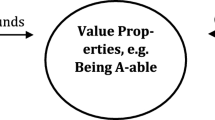Abstract
This paper outlines an adverbial approach of value, which it proposes as an alternative to a “nominalistic” one. It starts from a review of a recent book of a French economist, André Orléan, who develops, from the instance of money, a theory of value which he thinks valid for all social values. The paper criticizes the main presuppositions of Orléan’s model of value and tries to elaborate a more praxeological and a more social one.
Similar content being viewed by others
Notes
In The Rules of Sociological Method, Durkheim criticizes the import given by Tarde to imitation. Imitation “never expresses what is essential and characteristic in the social fact” (Durkheim 1894: 59, note 3). For a thorough exam of Durkheim’s and Tarde’s conceptions of imitation, see Karsenti (2006:162-182).
Durkheim himself viewed economic value as “a sort of power or efficacy”. As “we know the religious origins of the idea of power (…) it is seen that the ideas of economic value and of religious value are not without connection” (1912: “Conclusion,” note 2).
Cook introduces the idea of an “indirect imitation”. There is a kind of imitation in the fact that, in order to determine his conduct, an individual refers to ways of behaviour he has observed in the past. Such an imitation is indirect because, rather than directly reproducing what he sees others doing, and so doing like them, the individual reproduces the others’ behaviour within his response to his own gestures. He modifies thus his “impulsive tendencies to respond in certain ways to certain social stimuli provided by [his] own conduct” (1993: 90).
Unless the “objectiv Geist” should be considered as a psychic being.
References
Castoriadis, C. (1975). L’institution imaginaire de la société. Paris: Seuil.
Castoriadis, C. (1990). Le monde morcelé. Paris: Seuil.
Cook, G. A. (1993). George Herbert Mead. The Making of a social pragmatist. Urbana: University of Illinois Press.
Descombes, V. (2013). Les embarras de l’identité. Paris: Gallimard.
Dewey, J. (1910). How we think. Middle Works 6.
Dewey, J. (1916). Democracy and Education, Middle Works 9.
Dewey, J. (1925). Experience and Nature. Later Works 1.
Dewey, J. (1934a). A Common faith. LW9.
Dewey, J. (1934b). Art as experience. LW10.
Dewey, J. (1939a). Theory of valuation. LW13.
Dewey, J. (1939b). Freedom and culture. LW13.
Dewey, J. (1949). The field of value. LW 16.
Dupuy, J.-P., et al. (1989). Introduction. Revue Économique, 40(2), 141–145.
Durkheim, E. (1894). The rules of sociological method.
Durkheim, E. (1912), The elementary forms of religious life.
Garfinkel, H. (1967). Studies in ethnomethodology. Englewood Cliffs: Prentice-Hall Inc.
Garreta, G. (2008). De quoi parlent les jugements de valeur ? Dewey face à l’émotivisme. In F. Brahami (Ed.), Les affections sociales (pp. 269–307). Besançon: Presses universitaires de Franche-Comté.
Habermas, J. (1981). Theorie des kommunikativen Handelns. Frankfurt: Suhrkamp.
Joas, H. (2000). The genesis of values. Chicago: The University of Chicago Press.
Karsenti, B. (2006). La société en personnes. Paris: Economica.
Livet, P. (2003). Emotions et rationalité morale. Paris: PUF.
Livet, P. (2006). Les normes. Paris: A. Colin.
Livingston, E. (1987). Making sense of ethnomethodology. London: RKP.
Livingston, E. (2011). Etnometodologia sotto le cancellature. Quaderni di Teoria Sociale, 20, 11–60.
Lordon, F. (2010). La puissance des institutions (autour de De la critique de Luc Boltanski). Revue du MAUSS permanente. 8 avril 2010. http://www.journaldumauss.net/spip.php?article678.
Mead, G. H. (1913). The social self. In A. Reck (Ed.), G. H. Mead, selected writings (pp. 142–149). Chicago: The University of Chicago Press.
Mead, G. H. (1930). Cooley’s contribution to American social thought. AJS, 35(4), 693–706.
Mead, G. H. (1934). Mind, Self and Society. Chicago: The University of Chicago Press.
Orléan, A. [2014(2011)]. The Empire of value. A new foundation for economics. Cambridge: The MIT Press.
Taylor, C. (2004). Modern social imaginaries. Durham: Duke University Press.
Acknowledgments
I am grateful to Martin Aranguren, Daniel Cefaï, Roberto Frega, Joan Stavo-Debauge, Bénédicte Zimmermann, and the anonymous reviewers for their helpful comments on an earlier version of this paper.
Author information
Authors and Affiliations
Corresponding author
Rights and permissions
About this article
Cite this article
Quéré, L. Value as a Social Fact: An Adverbial Approach. Hum Stud 38, 157–177 (2015). https://doi.org/10.1007/s10746-014-9333-1
Published:
Issue Date:
DOI: https://doi.org/10.1007/s10746-014-9333-1




